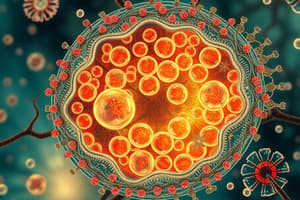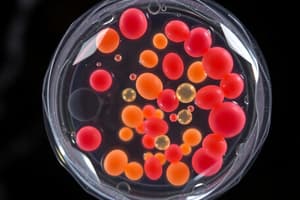Podcast
Questions and Answers
What is the function of the mitochondria in a cell?
What is the function of the mitochondria in a cell?
- Detoxification
- Energy production (correct)
- Lipid production
- Protein production
Where is DNA stored and expressed in a cell?
Where is DNA stored and expressed in a cell?
- Cytoplasm
- Ribosomes
- Nucleus (correct)
- Mitochondria
Which organelle is responsible for protein production, particularly for export out of the cell?
Which organelle is responsible for protein production, particularly for export out of the cell?
- Endoplasmic Reticulum (ER)
- Mitochondria
- Nucleus
- Ribosomes (correct)
What is the function of the Endoplasmic Reticulum (ER) in a cell?
What is the function of the Endoplasmic Reticulum (ER) in a cell?
Which region of a cell contains the cytoplasm and the nucleus?
Which region of a cell contains the cytoplasm and the nucleus?
What are cells often referred to as, serving as the building blocks of our bodies?
What are cells often referred to as, serving as the building blocks of our bodies?
Which organelle is responsible for breaking down hydrogen peroxide and other toxic substances?
Which organelle is responsible for breaking down hydrogen peroxide and other toxic substances?
What is the function of the cell membrane?
What is the function of the cell membrane?
Where is DNA stored in a cell?
Where is DNA stored in a cell?
Which organelle is involved in lipid production?
Which organelle is involved in lipid production?
What is the main function of ribosomes within a cell?
What is the main function of ribosomes within a cell?
In which organelle do chloroplasts carry out photosynthesis?
In which organelle do chloroplasts carry out photosynthesis?
What is the function of complex carbohydrates on the cell surface?
What is the function of complex carbohydrates on the cell surface?
Which organelle modifies and packages proteins for export from the cell?
Which organelle modifies and packages proteins for export from the cell?
What is the main function of the rough endoplasmic reticulum within a cell?
What is the main function of the rough endoplasmic reticulum within a cell?
What is the primary function of lysosomes within a cell?
What is the primary function of lysosomes within a cell?
Flashcards are hidden until you start studying
Study Notes
Cells: The Basic Units of Life
Cells are the smallest units of life, serving as the building blocks of our bodies. They are closed systems that can self-replicate and maintain homeostasis, allowing them to perform various functions necessary for life. This article will focus on the structure and functions of cells, including their organelles, cell membrane, and cell functions.
Cell Structure
Cells consist of two major regions: the cytoplasm and the nucleus. The nucleus is a membrane-bound structure that contains DNA in the form of chromosomes, while the cytoplasm is a fluid matrix that surrounds the nucleus and is bound by the outer cell membrane.
Cell Organelles
Cells contain numerous organelles, which are membrane-bound structures within the cytoplasm that have specialized functions. Some of the key organelles include:
- Mitochondria: These organelles are often referred to as the cell's "power plant" and are responsible for energy production.
- Nucleus: This organelle contains a cell's genes and serves as the location where DNA is stored and expressed.
- Ribosomes: These organelles are responsible for protein production, particularly for export out of the cell.
- Endoplasmic Reticulum (ER): The smooth ER is involved in lipid production and detoxification, while the rough ER is responsible for protein production.
- Golgi Apparatus: This organelle modifies and packages proteins for export from the cell.
- Peroxisomes: These organelles break down hydrogen peroxide and other toxic substances.
- Lysosomes: These organelles contain enzymes that help break down macromolecules and recycle their components.
- Transport Vesicles: These vesicles transport materials within the cell.
Cell Membrane
The cell membrane, also known as the plasma membrane, is a lipid bilayer that separates the inside and the outside of the cell. It controls what enters and leaves the cell, allowing it to maintain its structure and function.
Cell Functions
Cells perform various functions to maintain homeostasis and support life. Some of these functions include:
- Energy production: Cells break down sugars and oxygen to release energy, which is used for various cellular processes.
- DNA storage and expression: The nucleus contains DNA, which stores and expresses a cell's genetic code.
- Protein production: Ribosomes synthesize proteins, which perform various structural and regulatory roles within the cell.
- Lipid and carbohydrate production: The smooth and rough endoplasmic reticulum are involved in lipid and carbohydrate production, respectively.
- Photosynthesis: Chloroplasts in plant cells carry out photosynthesis, which produces sugars for the cell.
- Cell recognition and signaling: Complex carbohydrates on the cell surface play a crucial role in cell recognition and signaling.
In conclusion, cells are the basic units of life, comprised of various organelles and structures that work together to perform essential functions. Understanding cell structure and functions is crucial for understanding how living organisms function and maintain homeostasis.
Studying That Suits You
Use AI to generate personalized quizzes and flashcards to suit your learning preferences.




